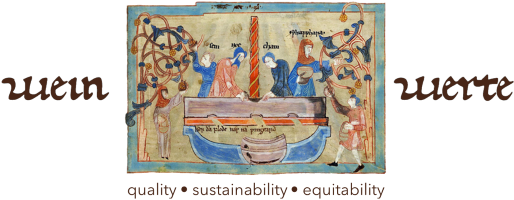About me
I was born in New Zealand/Aotearoa, the son of immigrant South African farmers with a colourful mix of English, Irish, French, German, and Dutch ancestry. I had the good fortune to grow up close to nature, in an almost painfully verdant landscape beneath wind- and rain-scoured skies often cut by the iridescent slash of a distant rainbow.
My parents were down-to-earth, hardworking, honest people, but certainly not wine connoisseurs. Like many of their compatriots, they washed down their summer barbecues with a bag-in-the-box red by the name of Velluto Rosso, an egregious misnomer that would surely have attracted the attention of the Advertising Standards Authority if its makers had not with seductive but at the same time obfuscatory cunning cast it in a foreign language.
I first developed a passion for wine during my days as an indigent student in Auckland, the closest that our far-flung isles have to a cosmopolitan centre. In order to earn my keep, I waited on tables in the evenings at a fashionable French restaurant by the name of Bonaparte. There a motley crew of European chefs and waiters, uprooted by history’s flow and deposited on our shaky shores by various waves of more or less legal immigration, had taken to serving the local population not only a passable imitation of continental cuisine, but also genuine vins français with outlandishly romantic names such as Crémant d’Alsace, Bordeaux Supérieur, Bourgogne Aligoté, and Côtes du Roussillon.
As a post-colonial country boy, I was enchanted by everything about these wines: their vinous diversity, their glamorous labels, and above all their sense of place. Not that I was interested in them as an expression of something as mundane as their geological terroir: to me these messages in a bottle rather possessed a metonymic quality, as enticing fragments of a richer, more serious, more sensual life at the distant navel of the world.
Their siren voices lured me to London, where I worked as a sommelier in a Michelin Star restaurant. There I became familiar with other names and tastes: Latour, La Tâche, Montrachet, d’Yquem. I imbibed the heady atmosphere of the metropolitan wine merchants, with their extravagant catalogues and ostentatious tastings in the banquet halls of gentlemen’s clubs and grand hotels.
Captivated by London’s luxury, I was tempted to throw myself into this deep, dark ocean of wine, to become a “member of the trade”. But then a different desire welled up in me, and put me on a new path. I left London to study languages and literature, a meandering and deeply rewarding journey that led through universities in England and Germany to a doctorate in medieval studies from the University of Cambridge.
Back on the continent, I discovered that paid employment in my field of specialization was scarcer than a bottle of Romanée-Conti 1945. Once again, however, Fortune smiled on me, turning me towards a career as a lecturer in languages and culture at universities of applied sciences in the Netherlands, Germany, Austria, and Switzerland. Especially my teaching in Swiss schools of business led to an engagement with the topic of sustainability, on the one hand as an attempt to rectify, at least in part, a perceived deficit in the general didactic practice of these institutions, but on the other as a concern shared with many of my individual colleagues and students.
Inspired by these young and not-so-young swimmers against the ideological mainstream, in 2018 I founded Wein Werte with the goal of implementing and further developing my ideas of sustainable viniculture from the vineyard to the empty bottle. The name is carefully chosen: it is my aim as an entrepreneur to align my business with the cultural values that I associate with wine. These values are thousands of years old, and they are rooted in the conviction that the welfare of the earth, of the workers who cultivate it, and of the people who enjoy the fruits of their labours are profoundly intertwined. However, like the winding way to the end of the rainbow, the pursuit of sustainability is the constantly changing embodiment of an ideal, and never a destination that has been reached. In the same vein, a values-based company such as Wein Werte must take its orientation from fundamental principles, but be flexible in their realization. Only so can it flow with the twists of time and thereby flourish.
In this way, the thread of sustainability has returned me, with a new sense of appreciation, to the source of my journey – to a deeper understanding of the value of the product whose allure first led me to leave the country of my youth, and to a stronger connection with the land that we all spring from, depend upon, and ultimately return to.
Craig Thorrold, founder and owner of Wein Werte.
